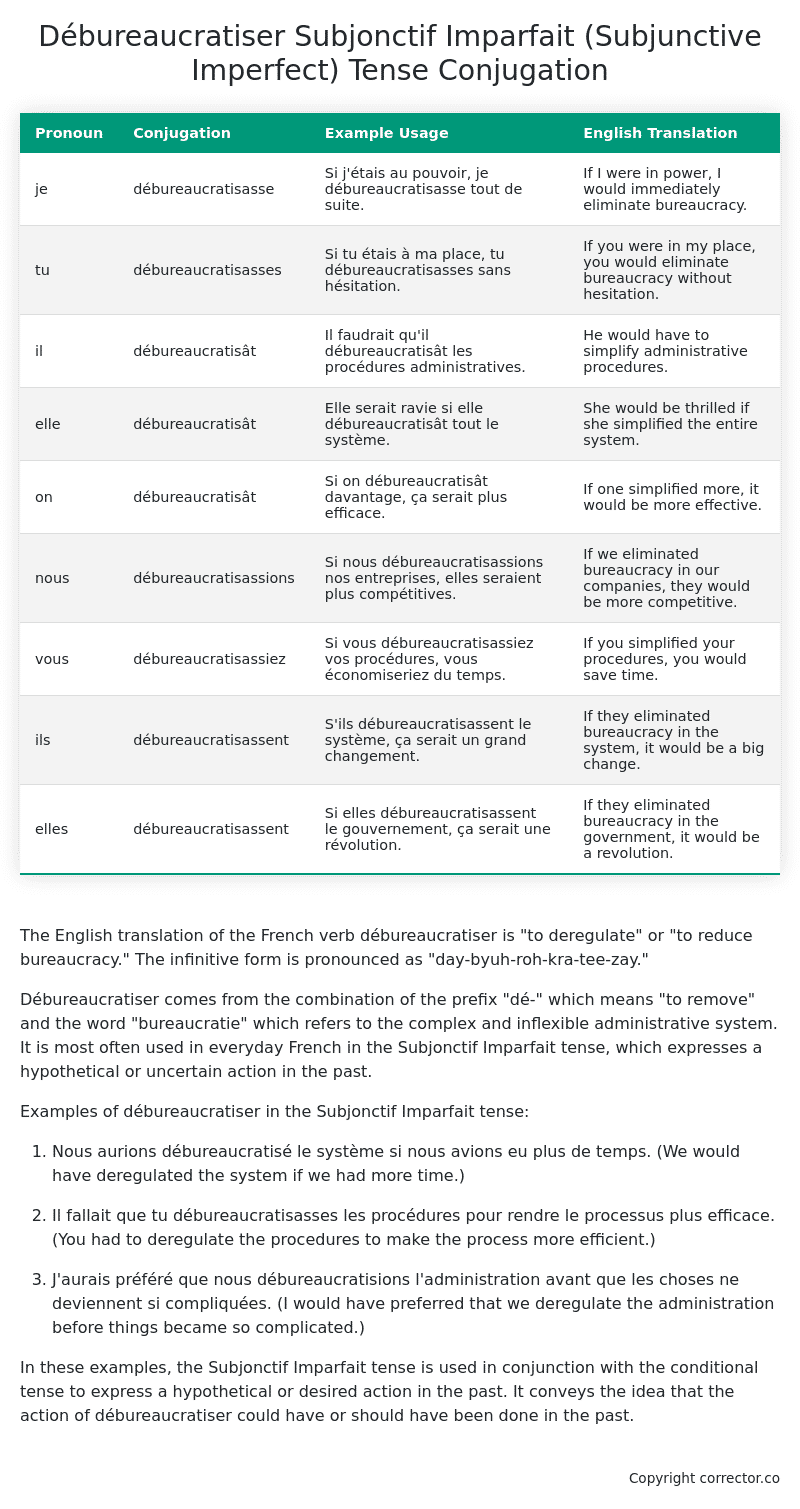Subjonctif Imparfait (Subjunctive Imperfect) Tense Conjugation of the French Verb débureaucratiser
Introduction to the verb débureaucratiser
The English translation of the French verb débureaucratiser is “to deregulate” or “to reduce bureaucracy.” The infinitive form is pronounced as “day-byuh-roh-kra-tee-zay.”
Débureaucratiser comes from the combination of the prefix “dé-” which means “to remove” and the word “bureaucratie” which refers to the complex and inflexible administrative system. It is most often used in everyday French in the Subjonctif Imparfait tense, which expresses a hypothetical or uncertain action in the past.
Examples of débureaucratiser in the Subjonctif Imparfait tense:
-
Nous aurions débureaucratisé le système si nous avions eu plus de temps. (We would have deregulated the system if we had more time.)
-
Il fallait que tu débureaucratisasses les procédures pour rendre le processus plus efficace. (You had to deregulate the procedures to make the process more efficient.)
-
J’aurais préféré que nous débureaucratisions l’administration avant que les choses ne deviennent si compliquées. (I would have preferred that we deregulate the administration before things became so complicated.)
In these examples, the Subjonctif Imparfait tense is used in conjunction with the conditional tense to express a hypothetical or desired action in the past. It conveys the idea that the action of débureaucratiser could have or should have been done in the past.
Table of the Subjonctif Imparfait (Subjunctive Imperfect) Tense Conjugation of débureaucratiser
| Pronoun | Conjugation | Example Usage | English Translation |
|---|---|---|---|
| je | débureaucratisasse | Si j’étais au pouvoir, je débureaucratisasse tout de suite. | If I were in power, I would immediately eliminate bureaucracy. |
| tu | débureaucratisasses | Si tu étais à ma place, tu débureaucratisasses sans hésitation. | If you were in my place, you would eliminate bureaucracy without hesitation. |
| il | débureaucratisât | Il faudrait qu’il débureaucratisât les procédures administratives. | He would have to simplify administrative procedures. |
| elle | débureaucratisât | Elle serait ravie si elle débureaucratisât tout le système. | She would be thrilled if she simplified the entire system. |
| on | débureaucratisât | Si on débureaucratisât davantage, ça serait plus efficace. | If one simplified more, it would be more effective. |
| nous | débureaucratisassions | Si nous débureaucratisassions nos entreprises, elles seraient plus compétitives. | If we eliminated bureaucracy in our companies, they would be more competitive. |
| vous | débureaucratisassiez | Si vous débureaucratisassiez vos procédures, vous économiseriez du temps. | If you simplified your procedures, you would save time. |
| ils | débureaucratisassent | S’ils débureaucratisassent le système, ça serait un grand changement. | If they eliminated bureaucracy in the system, it would be a big change. |
| elles | débureaucratisassent | Si elles débureaucratisassent le gouvernement, ça serait une révolution. | If they eliminated bureaucracy in the government, it would be a revolution. |
Other Conjugations for Débureaucratiser.
Le Present (Present Tense) Conjugation of the French Verb débureaucratiser
Imparfait (Imperfect) Tense Conjugation of the French Verb débureaucratiser
Passé Simple (Simple Past) Tense Conjugation of the French Verb débureaucratiser
Passé Composé (Present Perfect) Tense Conjugation of the French Verb débureaucratiser
Futur Simple (Simple Future) Tense Conjugation of the French Verb débureaucratiser
Futur Proche (Near Future) Tense Conjugation of the French Verb débureaucratiser
Plus-que-parfait (Pluperfect) Tense Conjugation of the French Verb débureaucratiser
Passé Antérieur (Past Anterior) Tense Conjugation of the French Verb débureaucratiser
Futur Antérieur (Future Anterior) Tense Conjugation of the French Verb débureaucratiser
Subjonctif Présent (Subjunctive Present) Tense Conjugation of the French Verb débureaucratiser
Subjonctif Passé (Subjunctive Past) Tense Conjugation of the French Verb débureaucratiser
Subjonctif Imparfait (Subjunctive Imperfect) Tense Conjugation of the French Verb débureaucratiser (this article)
Conditionnel Présent (Conditional Present) Tense Conjugation of the French Verb débureaucratiser
Conditionnel Passé (Conditional Past) Tense Conjugation of the French Verb débureaucratiser
L’impératif Présent (Imperative Present) Tense Conjugation of the French Verb débureaucratiser
L’infinitif Présent (Infinitive Present) Tense Conjugation of the French Verb débureaucratiser
Struggling with French verbs or the language in general? Why not use our free French Grammar Checker – no registration required!
Get a FREE Download Study Sheet of this Conjugation 🔥
Simply right click the image below, click “save image” and get your free reference for the débureaucratiser Subjonctif Imparfait tense conjugation!

Débureaucratiser – About the French Subjonctif Imparfait (Subjunctive Imperfect) Tense
Formation
Common Everyday Usage Patterns
Interactions with Other Tenses
Subjonctif Présent
Indicatif Passé Composé
Conditional
Conditional Perfect
Summary
I hope you enjoyed this article on the verb débureaucratiser. Still in a learning mood? Check out another TOTALLY random French verb conjugation!


